Complexity of Construction Techniques and Typology
The complexity of construction techniques and typology
The edifices have become more complex in the modern universe. This grade of complexness is a derived function of an iconic image or most significantly the intent it serves. Different typologies demand different attacks in footings of construction and aesthetics, the latter being a major driving factor in modern edifices. Nowadays, many of them have high grades of electrical and mechanical installing, employ sophisticated construction systems, and serve to change the demands of several terminal users. This grade of complexness differs among laypersons, interior decorators, undertaking directors, and building directors. Six cardinal steps of the complexness can be building construction and map, building methodological analysis, the urgency of the undertaking agenda, edifice size/ graduated table, geological conditions, and neighboring environment. Hence, the complexity of edifice undertakings is defined as a type of edifice undertakings that are convoluted, multifaceted, and composed of many interlinked parts. Though the complexity can’t be enumerated but taking different edifice typologies into consideration it can be viewed as a signifier of the proficient complexness of undertaking, the sum of convergences and interdependences in building phases, undertaking organization, and capriciousness of work at the site.
The degree of complexity was nondifferent in the common edifices of yesteryear. The nature and sum of hazards were mitigated by the repeat of the same edifice signifiers for different typologies with the building procedure being the same in the footings of stuff and techniques and the promotion in engineering was implemented in an incremental mode. The monumental graduated table of the Roman cathedrals, the pyramid, the Grecian temples, and the mighty Taj Mahal underwent a complex process of the building which evolved as a form with clip. For case, in the steps for the Taj Mahal stable on the banks of the Yamuna River, the foundation was taken deep plenty to bear the colossal construction. Different typologies of the edifices demanded different graduated tables but the nature of the building technique was the same, unlike the present context where options for taking edifice stuff and the manner are countless. Taking redevelopment of the old heritage edifices into context and besides taking into history the fact of transition taking to typology alteration in a child or major manner, the installing of the service line and transforming the support system pose strong jobs. The installation of retrofit air conditioning in the edifices and risk-prediction upon refurbished activities are the jobs that are greater than the affected faced by the edifice. The shutting of the gap made for the natural airing to obtain an enclosed infinite further increase the complexness.
Order custom essay Complexity of Construction Techniques and Typology with free plagiarism report
 450+ experts on 30 subjects
450+ experts on 30 subjects
 Starting from 3 hours delivery
Starting from 3 hours delivery
The modern progress in different typologies whether residential, institutional, or industrial forced people to look at construction in a different manner. The perceptual experience of modern edifices has changed over the p of the last century. Construction techniques have drastically changed with the inclusion of modern comforts which have become an inevitable demand. Electrification, air conditioning, composite buildings, drape walls, fire protection, structural damping, automatic controls, computing machine webs, and high public presentation glazing are some of them. When choosing the support system and the stuff the demand for them to be taken into consideration is high. They may change for the same edifice constituents of the different typologies. For case roofing system for a commercial-built signifier varies from that of a residential to commercial and industrial-built signifier. In footings of modern building, four chief beginnings of complexness are as follows:
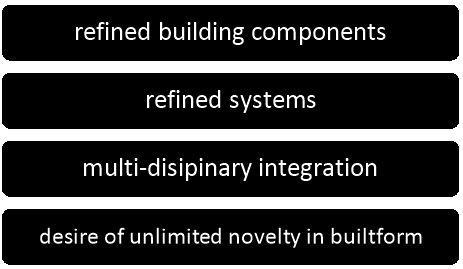
Refined edifice constituents: For centuries, steel, concrete, and wood have been used for centuries as base stuff for ages. Fabrication of constituents from these stuff has gone through infinite transmutations. Architecturally in complex edifices today, this stuff are frequently required to presume 3-dimensional geometries that cannot be adequately described with planar programs and subdivisions. In add-on, they need to run into a structural and environmental public presentation.







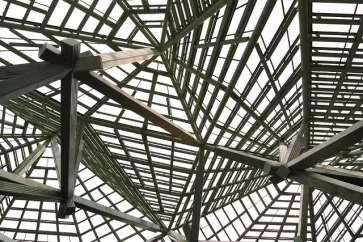
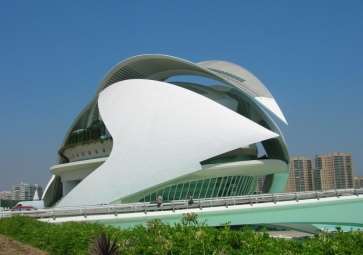






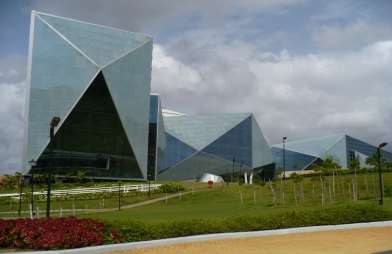
Criteria. Driven by the handiness of inexpensive computing machine power and by the pressing demand to conserve resources any system can be automatically controlled from window blinds to electrical lighting. This system seems to simplify the building procedure but the complexity may non be altered wholly. With greater understanding comes more specialization and frequently more elaborate and complex ordinances. Virtually any signifier can be erected provided it can be made to stand up. The lone restraints on this are aesthetic in footings of beat and economic. The three key quality demands are as follows:
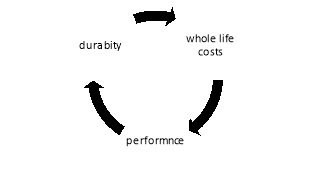 Glass has recently been established as charming stuff since it provides transparency and flow. But, building and managing troubles make glass vulnerable stuff excessively. Initially, glass was a symbol of these institutional edifices but in the modern universe glass has established itself as a major driving force in finding the destiny of construction. Glass now non merely is a facade covering component but has varied usage. For case, laminated glass is used in flooring every bit good, with the repairing techniques being further composite in nature. Discoursing a national and an international illustration: I.M. Pei’s invention at the Louver in Paris divides sentiment aggressively, but, it has decidedly improved things for visitants to this really busy museum who can line up under shadiness. This shadowing factor can be achieved by the agencies of Teflon or PVC awning for little infinities. This material choice would hold besides being based upon the strength of luminosity required in the needed infinite. So the graduated table affairs in footings of edifice stuff and hence raises its complexness.
Glass has recently been established as charming stuff since it provides transparency and flow. But, building and managing troubles make glass vulnerable stuff excessively. Initially, glass was a symbol of these institutional edifices but in the modern universe glass has established itself as a major driving force in finding the destiny of construction. Glass now non merely is a facade covering component but has varied usage. For case, laminated glass is used in flooring every bit good, with the repairing techniques being further composite in nature. Discoursing a national and an international illustration: I.M. Pei’s invention at the Louver in Paris divides sentiment aggressively, but, it has decidedly improved things for visitants to this really busy museum who can line up under shadiness. This shadowing factor can be achieved by the agencies of Teflon or PVC awning for little infinities. This material choice would hold besides being based upon the strength of luminosity required in the needed infinite. So the graduated table affairs in footings of edifice stuff and hence raises its complexness.
Even for the residential infinities fanlights are most likely the beginning of indirect visible radiation into the built signifier and associated with this are the installing and care factors that have to be taken attention of in big commercial infinities like promenades. In another illustration of national importance, the Infosys block, Mysore designed by Hafiz contractor: jagged frontages and lopsided fragment manner aesthetics of the package development block. There are no concrete walls in the lift. Laminated glass, dual glazing, and ceramic frit glass have been used to organize the outer tegument of this construction. Each lift of this edifice undertakes an alone face. The stairway inside is steel, maintaining the image of the edifice. In such illustration of institutional edifices
Prefabricated stuff has been encouraged due to less handiness of building clip period and several other restraints. Commercial typologies avoid utilizing concrete due to several jobs in past like stain, grading, maddening, checking, and curving. The clip factor of building with mention to these prefabricated elements has drastically reduced but at the same clip disadvantages of prefabrication include inflexibleness towards alteration in design, joinery, and escape, higher initial building cost since the cost is an instrumental factor in making up one's minding the complexness of building and trappings for any typology of the edifice. For illustration in the instance of any industrial godown or warehouse for put in a corrugated roofing of GI sheet structural framework need non be aesthetically appealing but in the instance of the same roofing at a resort, the construction layout of trussing is taken into consideration in order to accomplish aesthetically sound system, which straight amplifies the cost factor and farther complexness may increase in footings of silent person supports or laid out projections and pillars.
Apart from general building format iconic formats are larger aesthetics concentric. This monumental graduated table can’t conceal the complexity associated with it; its public presentation standards and long tally are an issue excessively. The Valencia Opera House designed by the Spanish designer Santiago Calatrava took 14 old ages to complete. The edifice described as “a blend of seagoing vas and spacecraft” or even “an elephantine warrior’s helmet” is a chef-d'oeuvre of modern architecture. The building required over 77,000m. of concrete, 275,000m? of Earth motion, 1,750 additive meters of hemorrhoids, 38,500m? of granite, 20,000m? of fractured ceramic tile mosaic, 3,360m? of glass, 20,000,000kg of structural corrugated steel, and 10,000,000kg of structural steel. The roof or 'feather plume ' is the most structurally dramatic item, 230m in length and dwelling of two 'shells ' which embrace the edifice on the exterior. These are constructed of laminated steel with an approximate weight of 3,000t and feature delicate mosaic ceramic work on the exterior. This portion of the edifice comments the most complex in the full domain structurally. The order of impressiveness can’t be negotiated over the construction as the theatre has a metal shell that tends to clasp as it expands and contracts in Valencia’s day-to-day temperature extreme. Such complexness makes the building procedure of such constructions on monolithic graduated tables problematic. Another illustration of such a typology of infinite which requires public engagement and a graduated table is the Guggenheim museum even the Ti sheets on the exterior facade can non conceal the structural uses of the interior infinite. The complexity of the insides of this Double tegument construction is apparent from the observation of the art critic Brian O’ Doherty who though being positive about the building’s attack criticizes the museum’s interior effects.
In different aspects of the modern universe complexness of constructing buildings with regard to changing typologies of built signifiers viz. institutional, residential, and industrial majorly depends upon its map, graduated table, and aesthetics. Renovation of old built signifiers is enumerated among them and chiefly depends upon the services every bit good. Cost and lastingness are secondary factors that determine complexness of construction to a larger extent. Concrete and glass as edifice stuff have garnered a major grasp. Prefabrication highlights the clip facet of the building procedure and besides has some disadvantages. Covering with the built signifier the complexity considerations or countries of concern should be taken into history. The demand and aesthetics being the chief driving factors for the choice of stuff and technique, the complexity of building techniques varies and depends upon physical constituents and context.
Cite this Page
Complexity of Construction Techniques and Typology. (2017, Jul 10). Retrieved from https://phdessay.com/complexity-of-construction-techniques-and-typology/
Run a free check or have your essay done for you


